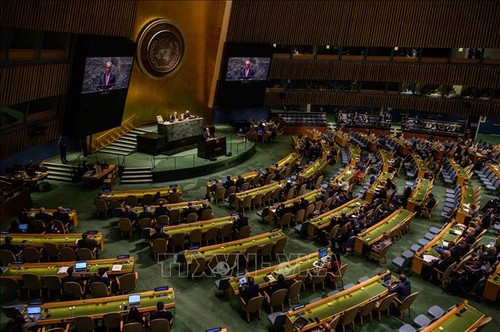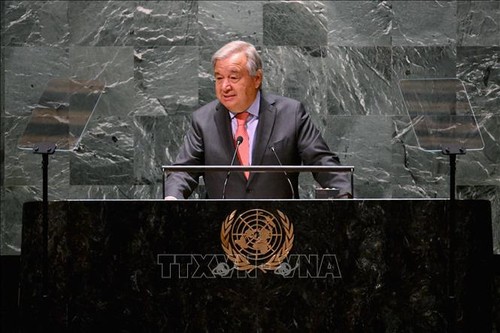 The 10th Review Conference of the Parties to the Treaty on the Non-Proliferation of Nuclear Weapons at the UN headquarters in New York on Monday (photo: Reuters) The 10th Review Conference of the Parties to the Treaty on the Non-Proliferation of Nuclear Weapons at the UN headquarters in New York on Monday (photo: Reuters) |
The Nuclear Non-Proliferation Treaty (NPT) was signed in 1968 and took effect in 1970. Its purpose is to prevent nuclear proliferation worldwide. The NPT has been ratified by 190 UN members.
Risk of a nuclear war
The 10th NPT Review Conference takes place amid growing warnings about the risk of a nuclear war. In his opening speech, UN Secretary General Antonio Guterres warned that the world is at a time of nuclear danger not seen since the height of the Cold War and one miscalculation may lead to nuclear annihilation. He said the Conference is an opportunity to strengthen the NPT and make it relevant to the current unstable world, citing the Russia-Ukraine conflict, the tense situation on the Korean Peninsula, and instability in the Middle East.
Speaking to the media before attending the Conference in New York, Japanese Prime Minister Fumio Kishida warned that global momentum to realize the goal of a world without nuclear weapons has been dwindling significantly.
Russian President Vladimir Putin, addressing the participants of the 10th NPT Conference in a letter, said there can be no winners in a nuclear war and no such war should ever be started. As a member of the NPT and one of the countries possessing a nuclear arsenal, Russia has always adhered to the policy and spirit of the Treaty.
Working together for a world free of nuclear weapons
 UN Secretary General Antonio Guterres UN Secretary General Antonio Guterres |
Secretary-General Guterres named five areas for action to strengthen the NPT: reinforce the Treaty, eliminate nuclear weapons, address the simmering tensions in the Middle East and Asia, promote the peaceful use of nuclear technology as a catalyst to advance the Sustainable Development Goals, and fulfill all commitments under the NPT.
President Putin stressed the need to strengthen and abide by the NPT, which has become an important part of the global security system and strategic stability since it was signed. The NPT outlines obligations related to nuclear non-proliferation and disarmament, the use of nuclear energy for peaceful purposes, and meeting the interests of both nuclear powers and non-nuclear states. Prime Minister Kishida pledged to energize the global effort toward a world without nuclear weapons.
Vietnam has always upheld a consistent view of completely eliminating nuclear weapons globally. Deputy Foreign Minister Ha Kim Ngoc told the 10th NPT Conference that Vietnam’s unswerving policy is to balance the three pillars of the NPT - non-proliferation of nuclear weapons, calling on countries to completely eliminate nuclear weapons, and the right of countries to use nuclear energy for peaceful purposes.
Mr. Ngoc said that countries possessing nuclear weapons have the key responsibility of denuclearization. He said Vietnam has strictly and responsibly fulfilled its duties under the NPT and other international commitments, including advocating for the Southeast Asia Nuclear Weapons-Free Zone (SEANWFZ) and related resolutions of the United Nations Security Council.